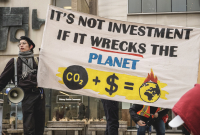United by fear and rage, UWaterloo students stand up for climate justice

The planet is literally burning, but it is still business as usual at the University of Waterloo.
The climate crisis is undeniably upon us and will affect every aspect of our lives. While it will hit vulnerable populations first and worst, none of us can escape its impacts, from wildfires to heat domes to flooding. As a student leader, I have seen first-hand the rising fear and anxiety my peers experience regarding the present realities and the future of our communities and the planet.
We are students, but we are people first and foremost. Many of us are international students, refugees or immigrants whose families, homes and ancestral lands are in the Global South. For us, climate change is not an abstract issue: it is already directly impacting us and our loved ones.
However, the pervading attitude on campus is that climate change is an issue that is out of sight, out of mind. In September 2019, as part of the Global Youth Strikes for Climate, more than 4,000 people gathered in Waterloo Square to call for climate action. Four years have passed, but the University of Waterloo has yet to seriously centre student needs in the face of the climate crisis, the rising cost of living, increasing tuition, safety in the face of increasingly polarized violence and international student precarity.
In the vacuum left by the pandemic and the lack of strong institutional voices to advocate for student needs, I and my co-lead organizer, Celine Isimbi, stepped up. Over the summer, we convened an independent coalition of undergraduate and graduate students under the banner of climate justice. We collectively understand that the climate crisis is a pressing existential threat that intersects with all other forms of injustice.
The UW Climate Justice Ecosystem is working to build and mobilize student power for an intersectional grassroots movement toward a sustainable, resilient, and just university for everyone.
We built our group from the ground up by approaching different people we knew in the few active pockets of advocacy left on campus. We reached out to a broad range of people, intentionally drawing connections between the climate crisis and economic justice, anti-racism and queer liberation, among other causes.
Slowly but surely, we began to gather interested students, all of us united by a sense of fear and rage at the university’s inaction on key issues. Today, we have representation from across the faculties and disciplines and our core group of organizers brings valuable expertise from the realms of environmental, labour and social justice.
We have been hard at work writing an open letter, a public manifesto of our group’s core demands. These are intersectional but rooted in climate justice: the belief that the climate crisis is not an amoral nor apolitical issue and is something that must be tackled with an equity and justice lens. We have woven our diverse perspectives into this document, and we write with a clarity and urgency that we believe is so lacking at the University of Waterloo.
Our 10 demands are not exhaustive by any means but are a snapshot of the most material issues that students face — from the climate and housing crises, to rising unaffordability, to the lack of mental health care, to growing hate and threats of violence directed at our most marginalized peers.
In the wake of the hate-motivated June 28 attack, we were all reminded that the university will not keep us safe: it is our responsibility to build a culture of care that can mobilize and respond to protect each other.
We will be gathering signatures from campus and community partners in the next few weeks before we send this open letter directly to senior administration and other executive offices. They will be sent a strong message that their complacency and negligence will no longer be tolerated by their largest and most influential stakeholder group: the student body.
At the end of September, almost exactly four years since the last big climate strike, we will be hosting a climate justice rally on campus. We are thrilled to have a dynamic and diverse lineup of student leaders speaking to their experience and knowledge on several of the issues we outlined in our open letter. Our hope is to respark the process of educating and empowering the student body to stand in solidarity with us and their peers.
There is so much to mourn in the deepening climate crisis, but this summer has proven to me how much hope and power we can build when we come together. We know that this is a good fight, but a long one. While there is so much work to be done, it is high time we rolled up our sleeves and got started again.
Michelle Angkasa (she/they) is a final-year environment and business student at the University of Waterloo. Michelle began her journey as a climate justice activist in 2019 with the Green New Deal-focused and youth-led group, Our Time, and organized throughout the pandemic for a just recovery. Since then, they have worked within and outside institutions to push for climate justice. Michelle has run as a Green Party of Ontario candidate and is currently co-chairing the divestment group Fossil Free UWaterloo, in addition to volunteering as a regional organizer at the Climate Reality Project Canada. Currently, Michelle’s efforts are focused on local and campus-level climate advocacy.







Comments
I'd love these very same students explain why they would support and vote for the conservative party, knowing full well, the CPC won't acknowledge that climate change is real. Anyone?
How do you know how they vote?